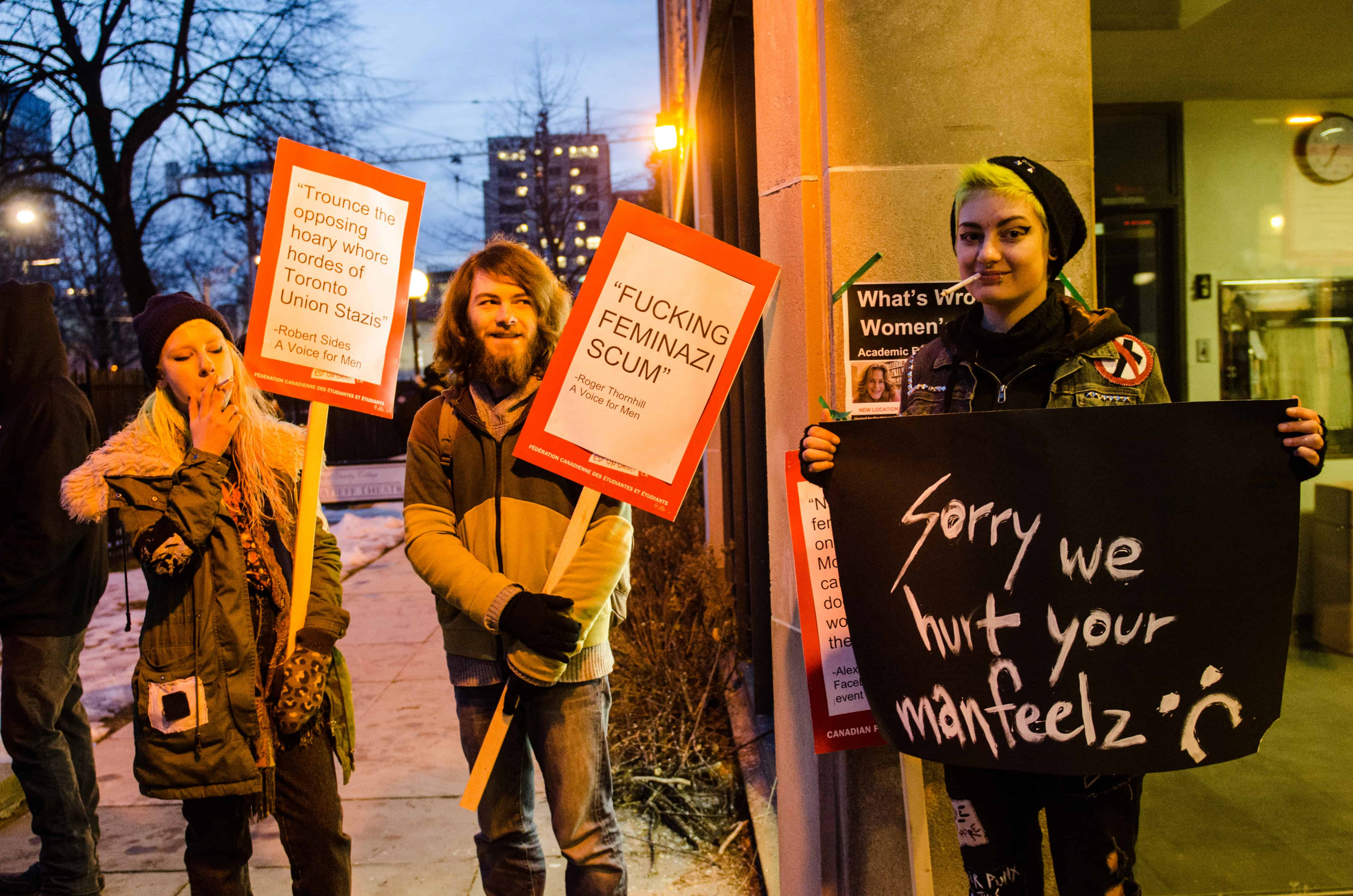A controversial speech critiquing feminist studies delivered by University of Ottawa professor Janice Fiamengo on Thursday evening was met by a smaller and less raucous group of protestors than the demonstrators that assembled last November at a lecture on a similar theme.
The lecture was held by the Canadian Association for Equality (CAFE) and an associated campus club called Men’s Issues Awareness at the University of Toronto (MIAUT). Protestors at the event said they believed the lecture and related discussions of “men’s issues” constituted hate speech, and therefore had no place on campus.
A previous lecture by Warren Farrell drew over 100 protestors, who blocked the doors and clashed with police and those entering the lecture hall, sparking a debate over the acceptable limits of free speech on campus. Farrell’s lecture was also hosted by CAFE and MIAUT.
The groups hosting Fiamengo claimed the university had granted them the use of the George Ignatieff Theatre, at Trinity College, free of charge “for reasons related to the law-breaking protest that occurred at our last event.”
“CAFE offers its appreciation to the University for its strong commitment to free speech on campus,” read a statement circulated to campus media outlets.
In an email to Trinity student heads and residence dons, the college’s assistant dean Adam Hogan urged students to avoid the event. “If you are talking to any students, I would discourage them from being around the event if they don’t have to be there (if they aren’t attending, or I guess protesting) and limit their travel through that area if they can help it,” read the email.
Concerns about a full-scale clash between protestors, guests, and police were not realized, although a fire alarm was pulled just as the lecture got underway, prompting an orderly evacuation.
Fiamengo’s lecture on “‘What’s Wrong with Women’s Studies?” examined what she identified as the problems with academic feminism and women’s and gender studies programs.
In her lecture, Fiamengo claims that “the whole reason for [feminism’s] being depends on an activist orientation towards women’s position on society,” suggesting it was a “fundamental contradiction” to premise a scholarly discipline on an “ideological agenda.”
“It can’t admit when its reformed goals have been achieved, because to do so would be to radically weaken the claimed necessity of its combined existence. So it must always find new wars to fight, new sources of deplority [sic] to decry … [feminism and women’s and gender studies] must always be advancing its ideological world view by whatever means necessary,” said Fiamengo.
Although there were no interruptions to the lecture beyond the fire alarm, several students critiqued Fiamengo’s material during a question period. Questions from audience members opposed to Fiamengo’s positions were greeted by jeering and heckling from the audience.
“I was disturbed by it,” said one student, a graduate student in the Women and Gender Studies program at U of T, who asked to remain anonymous after some protestors at the Warren Farrell event were targeted online in November.
“I really can’t get across how ridiculous this was,” she said. “Especially when she went through the course descriptions. There was no information, they may have been from different institutions or professors. She admits herself that it’s total speculation. Students should rally against this group.”
Several audience members sympathetic to Fiamengo declined interviews with The Varsity. Amber Taylor, a spokesperson for CAFE was also unavailable for comment as of The Varsity’s press time.
By the conclusion of the event, campus police had dispersed the remaining protestors.
“This talk served as a reminder,” finished the graduate student. “This talk is a reminder to anyone in any Women and Gender or Equity programs that what we’re engaging in active political discourse, and that what we’re studying has a real impact. It reminds us that what we’re doing is important.”


